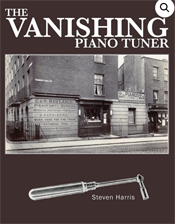Mr. N. Troth was born in Luanshya, Northern Rhodesia ( Zambia ), in 1953 I went to school in South Africa until 1969, when I came to Britain with my parents who both came originally from Birmingham.
In 1976, I started training as a piano tuner/technician at the Royal National College for the Blind in Hereford. Whilst attending the College, I came third in a national piano tuning competition with the result that when I qualified with Honours in June of 1980, I was offered a contract with Sandwell Education to service the pianos in 90 of their schools.
Nick has been vetted by the Disclosure and Barring Service (DBS) and therefore approved to work in situations with vulnerable adults and children. (Previously known as CRB checks).
Mr.E. N. Troth provides the following services:
• Tuning in Homes, Schools, Theatres and Concerts Venues.
• Voicing
• Minor on site repairs
• Full reconditioning service
• Replacement broken strings
• Supply and fit new castors
• Advice on purchasing a new or second-hand piano
• Valuation
• Piano Sales
• Piano Life Saver Installer
• Piano removals
Mr.E. N. Troth has been vetted by the Criminal Records Bureau (CRB) and approved to work in situations with vulnerable adults or children
Some of the clients I have tuned for at the
The National Exhibition Centre.
* Iggi Pop
* U2
* Shack Attack
* Russ Conway
* Chaz and Dave
* B B King
* Peter Green
* Elton John
* Lionel Richie
* Shirley Bassey
* Chris de Berg
* Michel Crawford
* Ocean Colour Scene
* Elkie Brooks
* The London Philharmonic
* D'orly Carte



